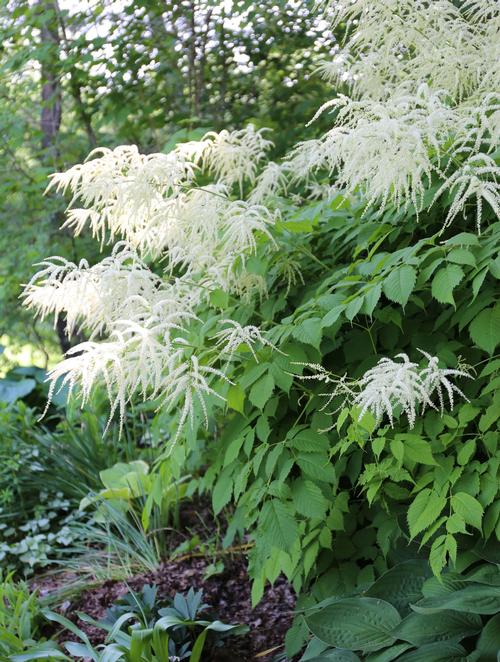Carefree Perennials That Don't Require Full Sun
In shady gardens, foliage colors, shapes and textures become even more important than flowers. When the light is soft and the air is cool, these more subtle design elements are easier to see and appreciate. Creating excitement with foliage rather than flowers, helps to ensure that shady gardens look as good in September as they do in May.
Generally, most shade-tolerant plants need 4 to 6 hours of sunlight each day. Some will tolerate less light than others. Ideally, shade-loving plants should receive morning or afternoon sun, or should be grown in the dappled light beneath shade trees. Their foliage should be protected from hot, midday sun.
Here are ten easy-care perennials that thrive in the shade. Mix and match them to create your own unique display of flowers and foliage.
ASTILBE
Known best for their brightly colored flower plumes, many of the newer Astilbe varieties also have colorful foliage that may be bronze, pale green, blue green, dark green or wine red. Planting an assortment of Astilbes with different foliage colors, flower colors, bloom times and heights, will help keep a shade garden interesting throughout the growing season. Astilbe foliage is typically 6” to 18” tall, with flower heights of 1 to 4 feet.
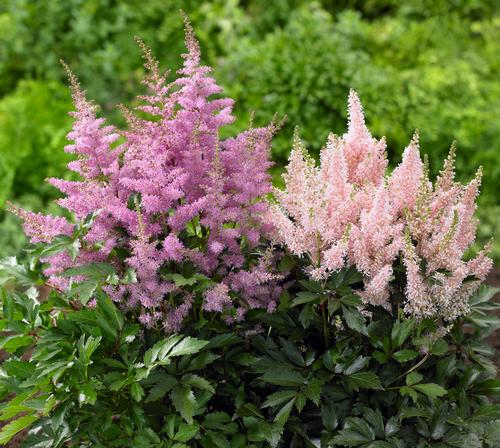
HOSTA
Hostas are the go-to perennial for shady gardens, and for good reason. They are tough, hardy and will flourish for years with little to no attention. Hosta foliage colors range from creamy white through gold, lime green, medium green and blue-green. Many varieties have variegated leaves and most produce white or lavender flowers in summer. Heights range from 4" to 36" tall.
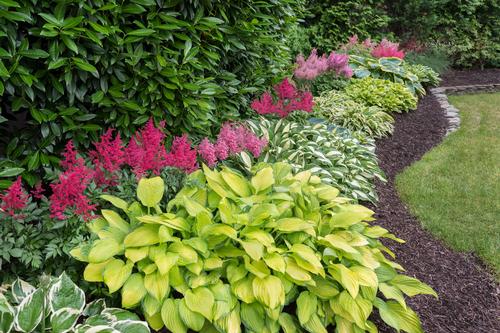
HEUCHERA
Plant breeders have had a field day with the genus heuchera, also known as coral bells. There seems to be no end to the variations in leaf color: silvery, burgundy, purple-black, chartreuse, salmon and rusty orange. With heuchera, it’s the foliage that provides the visual excitement, though most varieties also produce small, bell-like flowers on tall, slender stems. Heights range from 8” to 15”.
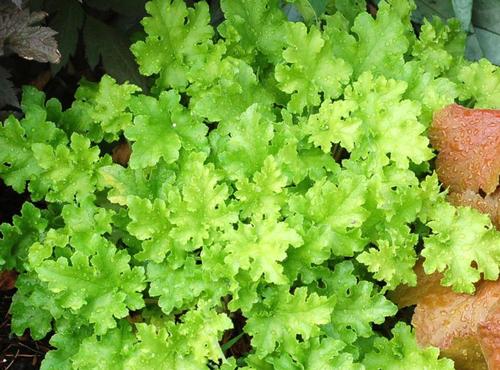
HELLEBORE
Hellebores have leathery, evergreen leaves and waxy, rose-like flowers in early spring. These long-lived, carefree plants gradually form large, attractive clumps that are happy to grow in moist or dry soil. Lenten rose (Helleborus niger) is the hardiest and has creamy white flowers in very early spring. Oriental hybrids (Helleborus orientalis) bloom later and have stunning flowers in shades of white, pink, rose and deep maroon. The blossoms are excellent for cutting.
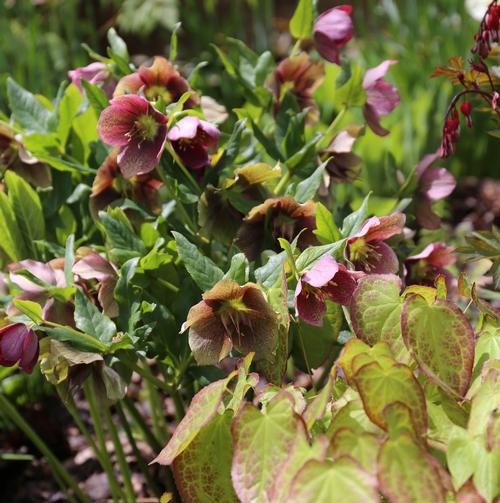
FERN
Most ferns grow best in areas that are cool, damp and shady. There are hundreds of different types to choose from -- so many that you could create a beautiful garden with nothing but ferns. Choose small ferns like the maidenhair fern and Japanese painted fern, or chest-high plants like the ostrich fern. Once established, they need no attention and will return dependably year after year.
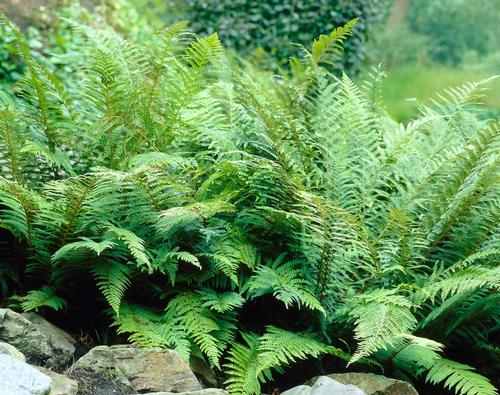
GERANIUM
Most perennial geraniums prefer full sun, but some, like Geranium phaeum, is a shade lover. This mounding plant has fuzzy, maple-like leaves that usually display attractive burgundy markings. The wine-red, purple or white flowers are produced on and off all summer long. Geranium macrorrhizum also grows well in light shade. It has fragrant, lime green leaves and hot pink flowers. Heights are 18" to 24".
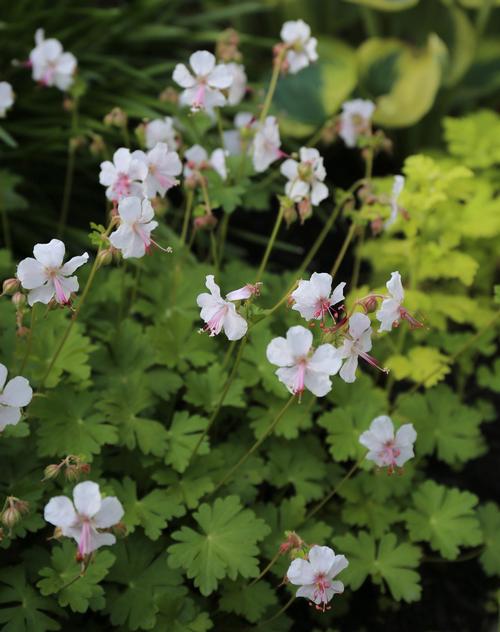
ALCHEMILLA
The pleated leaves of Alchemilla, which is better known as Lady’s mantle, are lime green with a slightly fuzzy surface. When the leaves are wet, water beads up into dazzling jewels. Alchemilla blooms in early summer. The large, long-lasting flower clusters are chartreuse in color and have a lacy texture. They are an excellent filler for cut flower arrangements. This low-growing, long-lived perennial is ideal for planting at the front of a border or along a path.
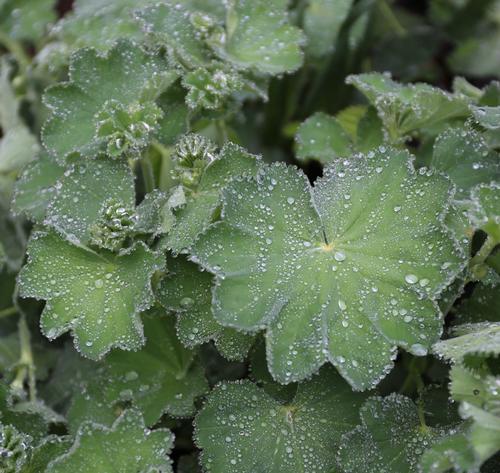
DICENTRA
Bleeding heart is a long-lived, trouble-free plant with fernlike foliage and dangling, heart-shaped flowers that may be white, pink or red. Dicentra spectablis (old-fashioned bleeding heart) grows 3 feet tall and wide. After it flowers, the foliage dies back to the ground until the following spring. All other types of Dicentra are shorter, flower in summer, and retain their attractive foliage throughout the season.
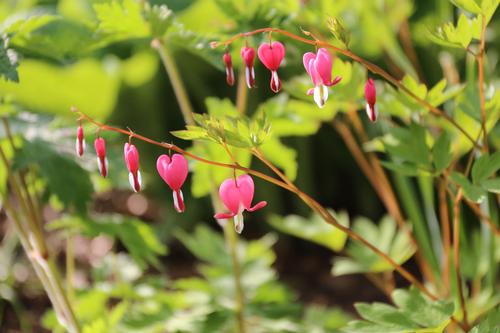
LAMIUM
This perennial is also known by its common name, dead nettle. It's a low, spreading plant with slightly fuzzy foliage that is usually a mix of green and silver. The late spring to early summer flowers can be purple, pink, red or white. In a shady location, lamium spreads happily -- but usually not invasively. It is also deer resistant. For a similar shade plant with variagated leaves, consider planting pulmonaria, which is more commonly known as lungwort.
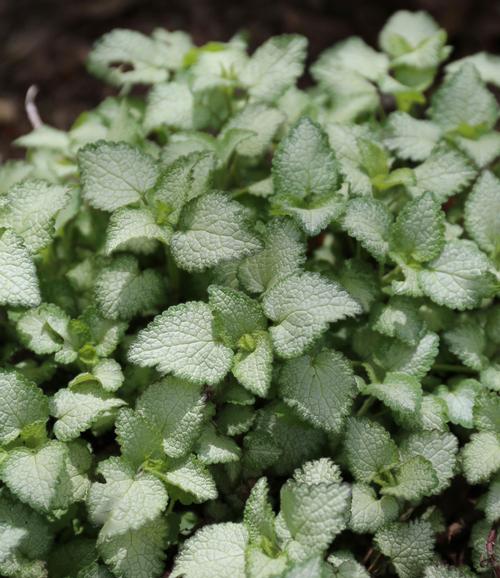
ARUNCUS
Also known as goatsbeard, this stately shade-lover is an excellent plant for adding height and structure. In spring, it quickly reaches a height of 3 feet and then in early summer, produces dramatic sprays of creamy white flowers. The foliage has a good presence throughout summer and fall. An excellent cut flower and a good companion for astilbe, hosta and other shade loving perennials.
To learn more about gardening in the shade, you may be interested in reading: Design Tips for Shady Gardens, Choosing Plants for Sun or Shade, Best Ground Covers for Shade and Best Ferns for Gardens and Landscapes.
